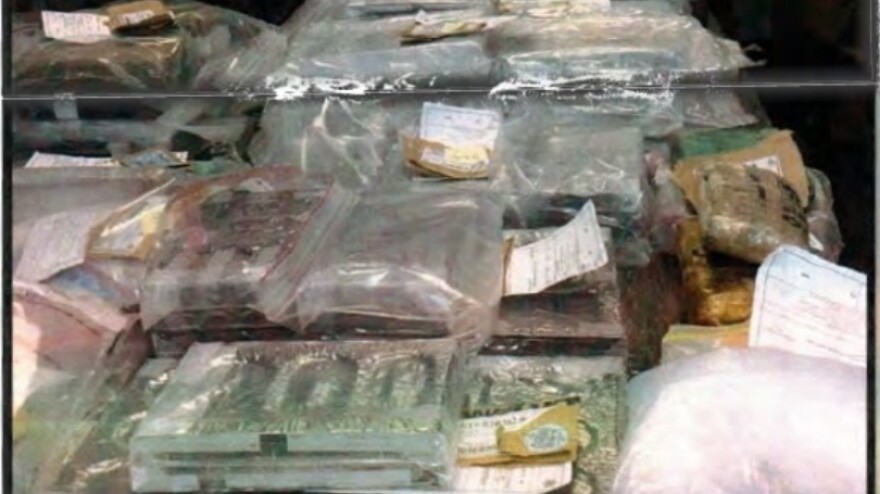U.S. officials say they've identified and infiltrated the Mexican drug organization that's largely responsible for the fentanyl crisis killing tens of thousands of Americans every year.
In a sweeping series of indictments targeting two dozen leaders and kingpins, the Justice Department blamed much of the carnage on the Chapitos network, a faction of the Sinaloa drug cartel.
"Over the last year and a half, the DEA proactively infiltrated the Sinaloa Cartel and the Chapitos network, obtained unprecedented access to the organization's highest levels, and followed them across the world," Anne Milgram, head of the U.S. Drug Enforcement Administration, said in a statement.
Officials say the Chapitos faction is led by the four sons of Joaquín "El Chapo" Guzmán, who is currently serving a life sentence in a federal prison in Colorado after being convicted in 2019 of numerous drug and murder conspiracy charges.
According to federal officials and drug policy experts, the Chapitos shifted their operation aggressively to focus on fentanyl.
"While El Chapo's [era of] Sinaloa was about cocaine and meth, and to a much lesser extent, heroin, the Chapitos' Sinaloa is about fentanyl," said Vanda Felbab-Brown, a drug trafficking expert at the Brookings Institution.
The Chapitos now allegedly operate a sophisticated network of fentanyl smugglers, money-launderers and drug-runners in countries around the world.
In court filings, the Justice Department and the DEA detailed private meetings and fentanyl deals over the past two years involving leaders and top operatives in Mexico as well as the United States, Austria and other countries.
"The Chapitos indictments in their detail and the undercover work that was required is a major accomplishment," said Felbab-Brown, who said the information suggests a "high-level infiltration" of the cartel by the U.S.
It's not clear how the intelligence was gathered, but one expert on the Mexican cartels told NPR it appears the U.S. has at least one paid informant inside the gang.
"I think at a high level they have a paid informant and likely undercover [agents] on the periphery [of the Chapitos network] around the globe," said Ioan Grillo, a Mexico City-based journalist whose books focus on the Mexican cartels.
A glimpse inside one of the world's most dangerous drug cartels
The indictments made public last week detail, among other things, what authorities say is the Chapitos network's sophisticated pipeline of fentanyl precursor chemicals from China.
The documents also describe extensive guns-for-fentanyl deals that involve the smuggling of military-grade weapons from the U.S.

In December 2022, according to the Justice Department, a Sinaloa operative in Vienna, Austria, tried to arrange a fentanyl-for-weapons swap that included 500 AR-15 rifles, along with hundreds of grenade launchers and rocket-propelled grenades.
U.S. officials say in addition to thousands of fentanyl deaths in American communities, the Chapitos network is responsible for a campaign of violence and terror inside Mexico.
"They often torture and kill their victims," U.S. Attorney General Merrick Garland said at a press conference when the indictments were announced. "They have fed some of their victims, dead and alive, to tigers belonging to the Chapitos."
U.S. officials say cartel leaders know the deadly danger fentanyl poses to Americans struggling with opioid addiction and that they simply don't care that so many people are being poisoned.
During a meeting in May 2022, according to the court documents, a Chapitos leader named Ovidio Guzmán López allegedly acknowledged fentanyl is lethal if the dosage is just a "little off."
"Indeed, multiple 'cooks' used by the cartel to manufacture its fentanyl at Chapitos-controlled labs in Mexico have died from testing the product," the federal indictment states.
"These guys are absolute creeps, these Chapitos dudes," said Sam Quinones, a journalist who has written extensively about the cartels and the fentanyl crisis. "I think bringing these previously untouchable princes of drugs to some kind of justice is a very good thing all the way around."
These indictments come as the Biden administration faces growing political pressure to stop, or significantly reduce, the flow of fentanyl into the U.S.
The Justice Department is offering tens of millions of dollars in rewards as part of the effort to arrest the gang's leaders.

As the U.S. "expands the battle space" against Mexican cartels, drug policy experts are skeptical
Drug policy experts interviewed by NPR agreed that capturing and prosecuting members of the Chapitos network would bring a measure of accountability for the devastating harm caused by fentanyl.
The street drug is now the leading cause of death for Americans between the age of 18 and 45, according to U.S. officials.
But the experts also voiced skepticism about how effective this effort will be reducing fentanyl smuggling and preventing overdose deaths.
One major complication is that Mexican officials are increasingly unwilling to join the U.S. effort by targeting the Sinaloa cartel aggressively inside their country.
U.S. officials describe these indictments as part of a global effort to "expand the battle space" against drug gangs, comparing the campaign to previous fights against terrorist groups.
But on Monday, Mexican President Andrés Manuel López Obrador blasted the U.S. for spying on the Sinaloa cartel without first gaining his government's permission. He described the DEA's infiltration of the Chapitos network as as part of a wider campaign of unauthorized espionage by U.S. agents inside his country.
"It is abusive, arrogant meddling, that should not be accepted under any circumstance," López Obrador said.
Experts say fentanyl is here to stay
As the diplomatic rift over the fentanyl crisis widens, experts also questioned the U.S. claim that dismantling the Chapitos network will reduce overdose deaths in American communities.
"I am quite pessimistic," said Jonathan Caulkins, who studies drug trafficking at Carnegie Mellon University. "In the best of all possible worlds, we would literally shrink the supply. That's very difficult to do. That was very difficult to do when it was cocaine and heroin, and for a bunch of reasons it's much harder with a synthetic."
Fentanyl is a synthetic opioid that can be made cheaply and easily from industrial chemicals widely available from producers in China and India. It's hugely profitable.

Caulkins and others told NPR that if the Chapitos are captured or sidelined from the fentanyl trade, other factions of the Sinaloa Cartel or other major drug gangs such as the Jalisco New Generation Cartel would quickly pick up the slack.
"The war on drugs hasn't worked," said Grillo, who noted many other kingpins, including "El Chapo," have already been arrested. "We've got more deaths from drug overdose than ever, we've got more violence between drug cartels in Mexico than ever."
But like others interviewed for this story, Grillo said bringing the Chapitos to justice is a laudable goal even if it doesn't stop the flow of fentanyl.
"They've been involved in multiple murders and intimidation," he said. "They're trafficking fentanyl, which has led to the deaths of thousands and thousands of Americans. So they're bad people, and having impunity isn't good."
Copyright 2023 NPR. To see more, visit https://www.npr.org.



